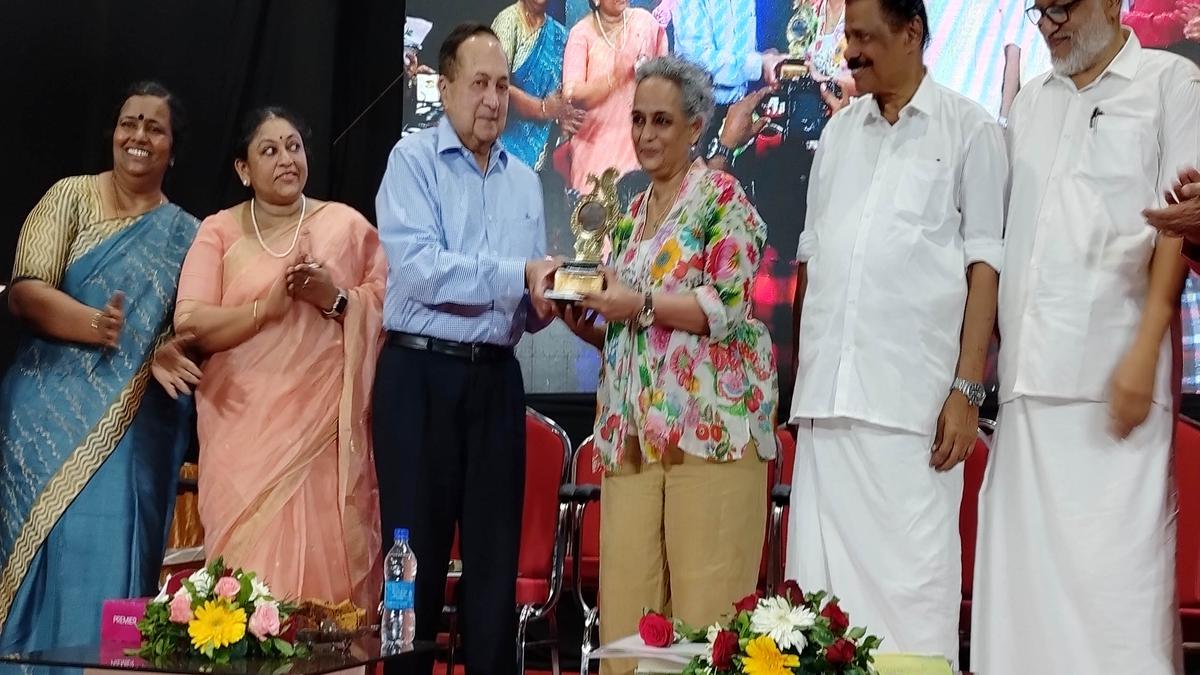
Country faces serious threat from inside: Arundhati Roy
The Hindu
The people of the country are facing a serious threat, according to writer-activist Arundhati Roy. She was speaking after receiving the third P.Govinda Pillai memorial national award instituted by the PG Samskrithi Kendram to perpetuate the memory of Marxist ideologue P. Govinda Pillai.
The people of the country are facing a serious threat, writer-activist Arundhati Roy has said.
She was speaking after receiving the third P.Govinda Pillai memorial national award instituted by the PG Samskrithi Kendram to perpetuate the memory of Marxist ideologue P. Govinda Pillai here on Wednesday.
Stressing the need to work together to thwart the designs of political annihilations, she said the proposed delimitation exercise in 2026 is likely to disempower all of South India by reducing the number of MPs to be sent to Parliament.
“The delimitation is not the only threat people face now. Federalism, the lifeblood of our diverse country, is also under a serious threat. The elected Chief Ministers of the opposition-ruled states have to literally beg to get their due share from the Centre. The latest blow to the federalism of the country is the recent Supreme Court verdict upholding the striking down of Article 370, special status given to Jammu and Kashmir. This is not the issue of Kashmir alone; it affects the fundamental structure of our polity, said Ms. Roy.
The country has lost the moral conscience to speak against heinous crimes as crimes like genocide and ethnic cleansing is now greeted with applause and political rewards. On the other hand, wealth is being concentrated into fewer and fewer hands, impoverishing the poor further. The most bewildering conundrum of our times is that in all of the world, people seem to be voting to disempower themselves. The fact is that who controls technology controls the world, said Ms. Roy, while exuding hope that the new generation will ultimately rise to the occasion to save the country.
Expressing shame on the silence of the country in the ongoing genocide in Gaza, she said that all over the world, millions of people, including Muslims, Jews, Christians, Hindus, Communists, and so on, are holding marches calling for an immediate ceasefire in Gaza.
“But our country, which once was a true friend of colonised people, is silent today. Most of the public intellectuals and writers, all but a very few, are also silent today,” she rued, while stating that the Israeli occupation of the West Bank and the siege of Gaza is a crime against humanity.

Hampi, the UNESCO-recognised historical site, was the capital of the Vijayanagara empire from 1336 to 1565. Foreign travellers from Persia, Europe and other parts of the world have chronicled the wealth of the place and the unique cultural mores of this kingdom built on the banks of the Tungabhadra river. There are fine descriptions to be found of its temples, farms, markets and trading links, remnants of which one can see in the ruins now. The Literature, architecture of this era continue inspire awe.

Unfurling the zine handed to us at the start of the walk, we use brightly-coloured markers to draw squiggly cables across the page, starting from a sepia-toned vintage photograph of the telegraph office. Iz, who goes by the pronouns they/them, explains, “This building is still standing, though it shut down in 2013,” they say, pointing out that telegraphy, which started in Bengaluru in 1854, was an instrument of colonial power and control. “The British colonised lands via telegraph cables, something known as the All Red Line.”









